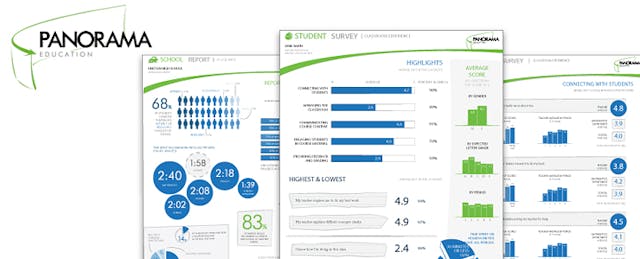High officials, Henry Kissinger reportedly once said, “learn how to make decisions but not what decisions to make.” The same may hold true for many district administrators and principals who are often removed from the day-to-day lives of teachers, students and their parents.
Boston-based Panorama Education wants to change that by helping schools and districts collect and analyze feedback from teachers, students and parents. It got a big boost toward this goal by securing $4 million in startup funds in an investment deal co-led by Mark Zuckerberg’s Startup:Education and SoftTechVC, with Google Ventures and Ashton Kutcher’s A-Grade Investments participating. Not bad for a company with over $500,000 in revenue.
Panorama’s system offers banks of surveys and questions designed to solicit feedback on all areas of school performance, including campus culture, academic expectations, student safety and parent engagement.
Results are aggregated into customizable online reports that allow users to filter and drill down by different criteria. Sample reports from schools and districts are currently available on the company website, some of which includes less-than-flattering responses.
The idea began when founder, Aaron Feuer, was still a high school student. In 2008 during his senior year at North Hollywood High School, Feuer served as president of the California Association of Student Councils. He traveled throughout the state asking students and teachers about how to improve schools, and nearly everyone said that feedback was paramount. He helped draft a California state bill, SB1422, that authorized schools to “establish a committee of pupils and teachers to develop a survey by which pupils may provide feedback to teachers.”
The bill passed in 2010, but Feuer wasn’t content. “That’s not how you make a difference in education, unfortunately. A few years later, when I was a junior [at Yale], I realized that nothing had happened.”
That’s when he and three of his classmates decided to develop a product that could put his idea directly into practice. They founded Panorama Education in April 2012. Within a year, Feuer says, 1,100 schools signed up. Currently, Panorama boasts more than 4,000 schools in over 250 districts, which includes the Los Angeles Unified School District and Aspire Public Schools. The company also has state-level contracts with Kentucky, Colorado, Massachusetts and Connecticut.
“We went from focusing on student surveys to giving a voice to students, parents and teachers,” says Feuer. “Administrators and teachers really want this feedback. We’ve never had a district turn us down because it was too expensive.”
The company charges an annual fee based on district size and requested features, which--peculiarly--also includes handling paper surveys and snail mail. Currently, Feuer says the smallest contract is $200. The New Haven Independent reported its district is paying somewhere between $52,000 and $60,000.
Panorama is the first edtech investment from Startup:Education, a non-profit started by Mark Zuckerberg. Startup:Education began with a $100 million grant Zuckerberg made to Newark public schools in 2010. A Facebook representative says the investment money for Panorama is distinct from the Newark funds.
Panorama was part of the Summer 2013 class of Y Combinator, whose partner and co-founder Paul Graham introduced the team to the Facebook CEO when he stopped by for a guest speaker session.
One other Boston-based organization also supports the idea that surveying the community surrounding a school can result in pivotal insights. The Harvard University Graduate School of Education has teamed with Survey Monkey to offer schools a free bank of questions to use with parents. The work is based on a 2002 paper, A New Wave of Evidence, The Impact of School, Family, and Community Connections on Student Achievement, by Harvard Lecturer, Karen Mapp. By contrast, Panorama includes teachers and students in its surveys.
The first priority for Panorama’s team of seven, shares Feuer, is to “assemble a team of the best engineers as possible.” Further down the line, he says, they aim to offer tools other than surveys to “close the feedback loop so that schools can really understand how things are happening and how to improve.”


